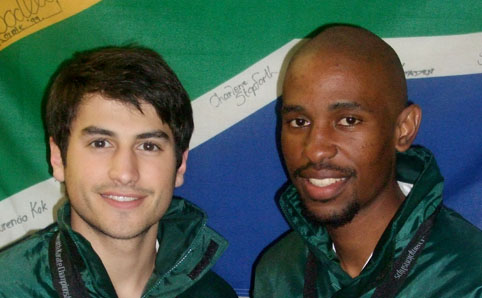|

|
|
Bruno Schwalbach and Balungile Ngofe
|
As part of the Protea Karate Team, two Kovsies represented South Africa at the Senior Commonwealth Karate Championships that took place in Sydney, Australia in July 2011.
Bruno Schwalbach achieved a three-medal haul, winning a silver medal in the Senior Kata, a bronze in die Senior o.67 kg Kumite and a bronze in the Senior Team Kumite. Balungile Ngofe achieved a prestigious fifth place in the Senior u.60 kg Kumite and a bronze medal in the Team Kumite.
Both Kovsies earned a place in the prestigious five-man Team Event, where the top-five fighters from each country competed head to head against other countries in what comprises the tournament's main event. South Africa narrowly lost the semifinal to Australia (the gold medallists), but still received a bronze medal.
These are excellent results at such prestigious karate championships, where most top achievers are world-cup medallists. Bruno Schwalbach was also selected to be part of the karateka South African Protea Karate Team that will represent South Africa at the All Africa Games in Maputo from 30 August 2011 to 23 September 2011. In October this year, Bruno will also represent South Africa as part of the National u.21 Protea Team, which will compete in the WKF World Karate Championships in Melaka, Malaysia.